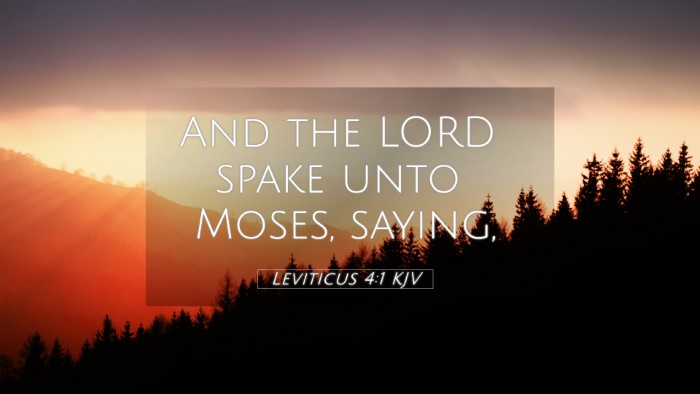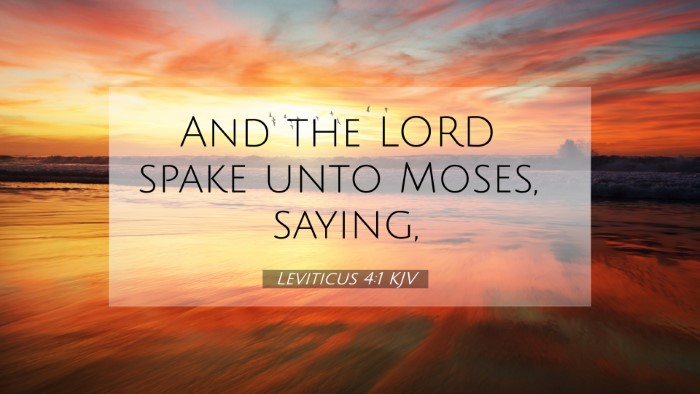Understanding Leviticus 4:1
Leviticus 4:1 states:
"And the Lord spake unto Moses, saying,"
This verse serves as an introduction to one of the major sections within the Book of Leviticus, which provides laws and guidelines for sacrifices, particularly those pertaining to sin offerings. The direct communication from God to Moses highlights the divine authority behind the instructions that follow.
Summary of the Meaning
The significance of Leviticus 4:1 can be explored through various key insights:
-
Divine Revelation:
The phrase "the Lord spake unto Moses" emphasizes the relationship between God and His chosen leader. This connection highlights the importance of divine revelation in guiding the Israelites toward righteousness.
-
Moses as Mediator:
Moses acts as a mediator between God and the people, conveying God's laws. This foreshadows the role of Christ, who ultimately mediates a new covenant.
-
Preparation for Sacrificial Laws:
This specific verse sets the stage for the subsequent chapters, which enumerate the types of sacrifices, particularly those required for atonement, marking an essential aspect of Israelite practice.
Connections to Other Bible Verses
Leviticus 4:1 can be cross-referenced with various scripture passages that illuminate its meaning:
- Exodus 25:22: "And there I will meet with thee, and I will commune with thee from above the mercy seat." This verse emphasizes the communication between God and Moses.
- Exodus 20:1: "And God spake all these words, saying," illustrating God's direct communication with His people.
- Hebrews 10:4: "For it is not possible that the blood of bulls and of goats should take away sins," linking the sacrificial system established in Leviticus to the New Testament emphasis on Christ's ultimate sacrifice.
- Romans 3:25: "Whom God hath set forth to be a propitiation through faith in his blood," which speaks to the themes of atonement present in Levitical law.
- 1 John 1:9: "If we confess our sins, he is faithful and just to forgive us our sins," connecting the need for confession and atonement both in Leviticus and the New Testament.
- Isaiah 53:5: "But he was wounded for our transgressions, he was bruised for our iniquities," further linking the Old Covenant's sacrificial system to Christ's redemption.
- Leviticus 16:21: "And Aaron shall lay both his hands upon the head of the live goat...and all the iniquities of the children of Israel shall be put upon the head of the goat," illustrating the concept of ascribed guilt and atonement in the sacrificial system.
Comparative Bible Verse Analysis
In engaging with Leviticus 4:1, it is beneficial to consider the thematic connections to both the Old and New Testaments. The sacrificial practices set forth in Leviticus reflect the principles of sin, atonement, and purification that are pivotal throughout the biblical narrative. This verse leads into a broader discussion about:
- The Nature of Sin: A comprehensive examination reveals the necessity of understanding sin's seriousness and the need for atonement. This concept is carried throughout the scriptures.
- Atonement and Sacrifice: The sacrificial system initiated in Leviticus is foundational for understanding New Testament references to Christ as the Lamb of God.
- The Holiness of God: Each directive, including those highlighted in Leviticus, serves to underscore God's holiness and the separation created by sin.
Tools for Bible Cross-Referencing
In studying passages like Leviticus 4:1, several tools enhance the understanding of inter-Biblical dialogue:
- Bible Concordance: A comprehensive index of words and their occurrences assists in identifying thematic connections.
- Bible Cross-Reference Guide: These resources enable readers to see connections across various texts, enriching the study of scripture.
- Cross-Reference Bible Study: Groups or personal studies can gain greater insight by comparing related verses and themes.
Conclusion
Leviticus 4:1 is foundational for understanding the sacrificial laws and the covenantal relationship between God and Israel. By exploring its themes and cross-references, believers and scholars can discern deeper meanings within the biblical text, enhancing their understanding of sin, atonement, and God's holiness.


